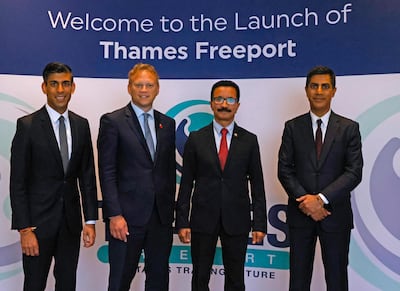Chancellor of the Exchequer Rishi Sunak opened Britain’s first post-Brexit freeport – the UAE-backed Thames Freeport – on Wednesday as the nation looks to boost its trade ambitions after its exit from the European Union.
Thames Freeport, which combines DP World’s London Gateway and Forth Ports’ Port of Tilbury into a freeport zone with Ford’s Dagenham automotive engine plant, is one of eight new freeports that allow companies to trade with the UK under simplified customs, tax and planning rules.
The opening came as DP World said it would invest £300 million ($414.8m) into building a fourth berth at its London Gateway port to create more capacity.
“Our new freeports will create national hubs of trade, innovation and commerce, and attract more investment to regenerate communities and level up the UK,” Mr Sunak said, at the freeport’s commercial launch at the Savoy Hotel in London.
“Bringing ports and business together to invest in their regions is crucial to the Freeports success story – that’s why I’m thrilled that DP World is investing £300m to support Thames Freeport – creating new opportunities, boosting growth and supporting local jobs.”
DP World will begin work next month on the fourth berth at its London Gateway logistics hub to increase supply chain resilience and create more capacity for the world’s largest vessels.
The global ports operator said the £300m builds on the £2 billion DP World has invested in Britain over the past decade.
Sultan Ahmed Bin Sulayem, group chairman and chief executive of DP World, said he was “delighted” to go ahead with the company's “latest major investment in the UK, which will give London Gateway more capacity to handle the world’s largest vessels than any other port in the country”.
“As a central pillar of Thames Freeport, London Gateway’s new fourth berth will allow even more customers to benefit from world-class ports and logistics, with unrivalled global connectivity, on the doorstep of Europe’s largest consumer market,” Mr Bin Sulayem said.
“DP World plans to be at the heart of Britain’s trading future and this investment shows that we have the ambition and the resources to boost growth, support businesses, create jobs and improve living standards.”
In the first six months of 2021, London Gateway saw record throughput of 888,000 TEU (20-foot equivalent unit), an increase of more than 23 per cent on the previous best performance for the first half of a year, DP World said.

The fourth berth will raise capacity by a third, with completion coinciding with the delivery of a new wave of 24,000 TEU vessels in 2023 and 2024, operated between Asia and Europe.
Thames Freeport said it was “open to do business with new customers”, with “land ready for development now in Europe’s biggest consumer market and resurgent industrial cluster”.
Alan Shaoul, chief financial officer at DP World in the UK, said the Thames Freeport offered "outstanding financial incentives, potentially the equivalent of up to 50 per cent of the cost of the real estate over five years".
“These include no stamp duty on land purchases, savings on employer national insurance contributions, a five-year business rates holiday and generous capital allowances on investment. The flexibility within the freeport’s customs zone will also help manage non-tariff barriers, supporting businesses trading with the EU and the rest of the world,” Mr Shaoul said.
Britain's eight new economic zones were unveiled by Mr Sunak in his March budget, with East Midlands Airport, Felixstowe and Harwich, Humber, Liverpool City Region, Plymouth, Solent, Thames and Teesside all securing freeport status.
DP World Southampton has also been awarded freeport status as part of Solent Freeport, further highlighting the critical role the Dubai-backed logistics centres play in the UK’s international trade.
The freeports are championed by the British government as a way to help the country build back better from the pandemic by boosting jobs and attracting trade and investment.
The Thames Freeport launch ties in with London International Shipping Week, in which Britain, the host of this year’s Cop26 environment summit, has already called for net zero global shipping emissions by 2050.
While international regulations require the global shipping industry to cut its emissions by 50 per cent compared with 2008 levels, the UK Chamber of Shipping wants the International Maritime Organisation to double this target and commit to net zero emissions by the middle of the century.
Thames Freeport said the economic zone would “support innovative, low carbon technologies", as it looks to support the London Port Authority’s “ambitious 2040 net zero target” through capital investment, skills development, and the promotion of investments in clean energy generation such as hydrogen.
“Through the Port of London Authority, the tidal Thames connects all freeport sites to the consumer markets of London and the south-east, creating the infrastructure for an innovative and green trading corridor. We are determined to play a leading role in the journey to net zero,” said Robin Mortimer, chief executive at the Port of London Authority.


